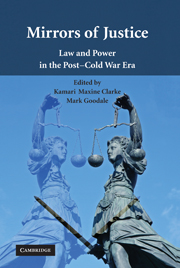Book contents
- Frontmatter
- Contents
- Editor Biographies
- Contributors
- Acknowledgments
- Introduction: Understanding the Multiplicity of Justice
- 1 Beyond Compliance: Toward an Anthropological Understanding of International Justice
- PART I JUSTICE AND THE GEOGRAPHIES OF INTERNATIONAL LAW
- PART II JUSTICE, POWER, AND NARRATIVES OF EVERYDAY LIFE
- 7 The Victim Deserving of Global Justice: Power, Caution, and Recovering Individuals
- 8 Recognition, Reciprocity, and Justice: Melanesian Reflections on the Rights of Relationships
- 9 Irreconcilable Differences? Shari'ah, Human Rights, and Family Code Reform in Contemporary Morocco
- 10 The Production of “Forgiveness”: God, Justice, and State Failure in Post-War Sierra Leone
- PART III JUSTICE, MEMORY, AND THE POLITICS OF HISTORY
- Epilogue: The Words We Use: Justice, Human Rights, and the Sense of Injustice
- Index
- References
7 - The Victim Deserving of Global Justice: Power, Caution, and Recovering Individuals
Published online by Cambridge University Press: 25 January 2010
- Frontmatter
- Contents
- Editor Biographies
- Contributors
- Acknowledgments
- Introduction: Understanding the Multiplicity of Justice
- 1 Beyond Compliance: Toward an Anthropological Understanding of International Justice
- PART I JUSTICE AND THE GEOGRAPHIES OF INTERNATIONAL LAW
- PART II JUSTICE, POWER, AND NARRATIVES OF EVERYDAY LIFE
- 7 The Victim Deserving of Global Justice: Power, Caution, and Recovering Individuals
- 8 Recognition, Reciprocity, and Justice: Melanesian Reflections on the Rights of Relationships
- 9 Irreconcilable Differences? Shari'ah, Human Rights, and Family Code Reform in Contemporary Morocco
- 10 The Production of “Forgiveness”: God, Justice, and State Failure in Post-War Sierra Leone
- PART III JUSTICE, MEMORY, AND THE POLITICS OF HISTORY
- Epilogue: The Words We Use: Justice, Human Rights, and the Sense of Injustice
- Index
- References
Summary
INTRODUCTION
Since the late 1990s, victims of mass atrocity have been led to believe that they can expect to be included to a greater extent than previously in international criminal prosecutions of those accused of harming them through genocide, crimes against humanity, and war crimes. Most notably, the new International Criminal Court (ICC), established by the Rome Statute in 1998, is mandated to address victims' interests in ways that go beyond previous responses to the world's gravest crimes, such as those undertaken through the ad hoc tribunals after the conflicts in the former Yugoslavia (International Criminal Tribunal for the former Yugoslavia; ICTY) and Rwanda (International Criminal Tribunal for Rwanda; ICTR). The ICC's approach to victims has been labeled “innovative,” and a New York Times Magazine cover story touted Luis Moreno-Ocampo, the ICC's first Chief Prosecutor, as a beacon of hope for victims in the Darfur region of Sudan and of other conflicts involving mass violence. In public presentations, the ICC Chief Prosecutor routinely includes pictures of victims (e.g., a maimed child lying in a hospital bed in northern Uganda) to make the point that certain individuals deserve justice from the global community. By drawing on such images, he and other supporters of the ICC highlight the significance of his decision to bring what he refers to as “global justice” into this particular conflict and also the assumption that the ICC is obligated and committed to delivering justice to victims.
- Type
- Chapter
- Information
- Mirrors of JusticeLaw and Power in the Post-Cold War Era, pp. 149 - 170Publisher: Cambridge University PressPrint publication year: 2009



